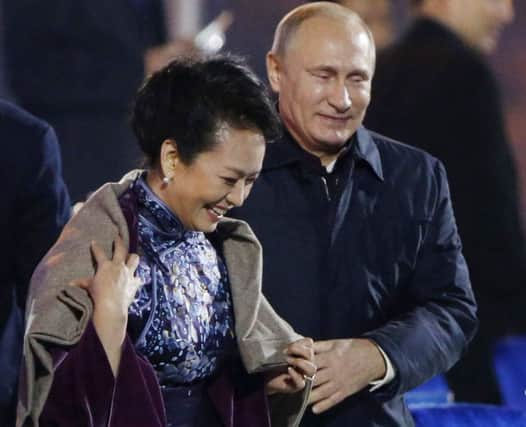Leaders: Putin ‘shawl chivalry’ may cloak dark intent


But unfolding events in Ukraine point to a darker side to his preoccupations. Russian military vehicles have been seen crossing the Russian-Ukrainian border, sparking fears that the fragile ceasefire may be at an end. But in some areas it seems the ceasefire never really began.
Fighting in the eastern region of Ukraine has continued despite a ceasefire deal struck in September. Both sides have accused each other of shelling and other violations. Now, there are concerns that pro-Russian Ukrainian separatists have recaptured Luhansk airport, regained ground and opened up a new front.
Advertisement
Hide AdAdvertisement
Hide AdThis is no sporadic skirmish of light arms but a conflict with a high and rising casualty rate and one that has deeply soured relations between Russia and the West. Trade sanctions have pushed Russia’s economy towards recession and caused its currency to tumble. On the ground more than 4,000 people have died in the conflict and nearly one million people have fled their homes since the fighting started in April, a month after Russia annexed Ukraine’s southern Crimea peninsula.
This is death and human misery on a scale not experienced in the region since the Second World War. And it may well be memories of that savage period and its colossal death toll that feed Russian fears of unchallenged Nato encirclement.
With international attention in the autumn drawn towards the Arab-Israel conflict in Gaza, the outside world may have gained the impression that the ceasefire was holding and that following the election Ukrainian troops had succeeded in driving the rebels back. Ukraine has repeatedly stated that a number of Russia’s regular troops have been killed in fighting in the Donetsk and Luhansk regions. Nato’s top commander, US General Philip Breedlove, said that a Russian deployment in Ukraine – reported by Nato officials on Wednesday – might be intended to reinforce “pockets” under separatist control. Moscow denies the allegations as propaganda, but admits that what it describes as “Russian volunteers” are fighting alongside the rebels.
CONNECT WITH THE SCOTSMAN
• Subscribe to our daily newsletter (requires registration) and get the latest news, sport and business headlines delivered to your inbox every morning
What lies behind the latest reports of renewed Russian military activity? A UN official has outlined several theories, none of them comforting. One is of a return to full-scale fighting. Another is of a simmering conflict with low-level battles that will destabilise Ukraine and its economy. A third is a frozen or protracted conflict “that would entrench the status quo in south-eastern Ukraine for years or decades to come”. Mr Putin may well be calculating that, without a decisive military response by the West he can succeed in his aim of building a buffer zone for Russia in a flagrant breach of Ukrainian sovereignty. Seems he may be right.
A hard act to follow
ALEX Salmond has left no mere mark at Holyrood as First Minister – more a permanent dent. He has seen off not one but four leaders of Scottish Labour – a party whose grip on Scotland seemed unshakeable seven years ago, until Mr Salmond shook it to the core.
Liberal Democrat and Conservative leaderships have also changed guard. During his long period as FM, he has knocked about his opponents like a prizefighter practising on a row of punchbags. Few would grudge him landing a few more rhetorical blows yesterday on a Labour opposition that could not match him for political pugnacity – or chutzpah. Johann Lamont, the former Scottish Labour leader, came nearest to landing a punch but never a blow that had him on the ropes.
Few would watch these displays at First Minister’s Questions for their gentlemanly charm or measured sagacity. His responses to questions on many occasions were dismissive and aggressive. When straight responses could not be given, there was frequent resort to fancy evasive footwork. He has maintained a reputation of being Scotland’s most formidable politician right to the end. Even defeat in the ferociously fought independence referendum seems to have worked for the SNP. In all opinion polls, the party’s lead over Labour, far from wilting after seven years in office, has grown to have every appearance of unassailability.
Advertisement
Hide AdAdvertisement
Hide AdIn Holyrood, at First Minister’s Questions, Alex Salmond established a role that will be hard to follow. He always provided spectacle that ordinary people could identify with. He spoke in language they could understand.
SCOTSMAN TABLET AND IPHONE APPS